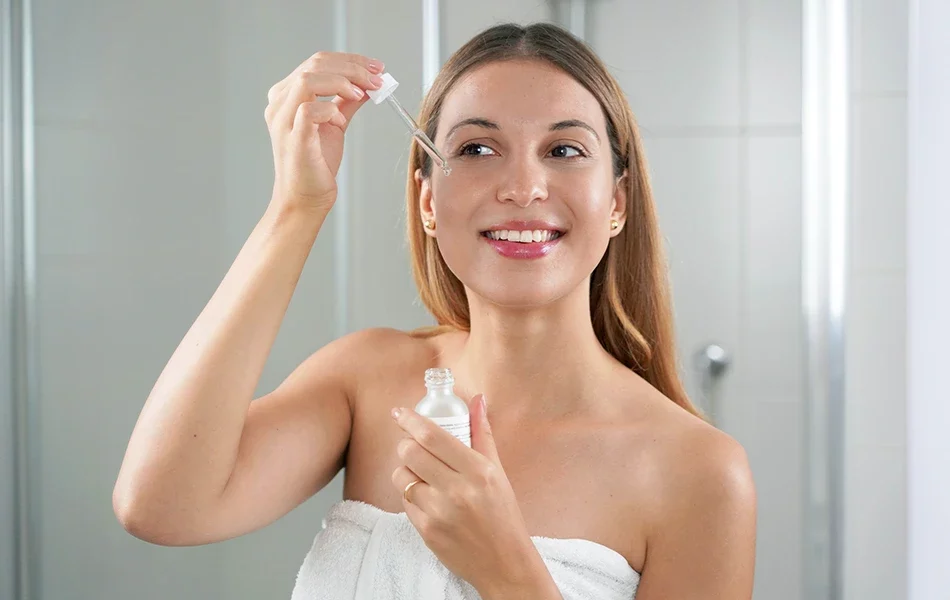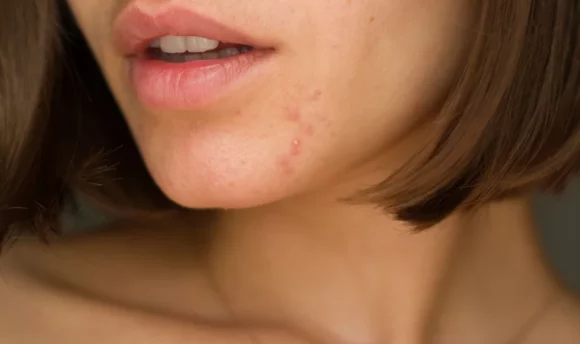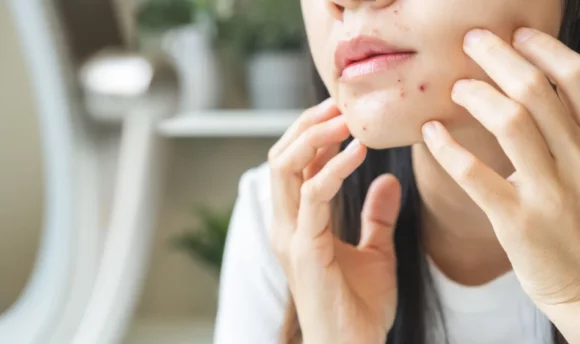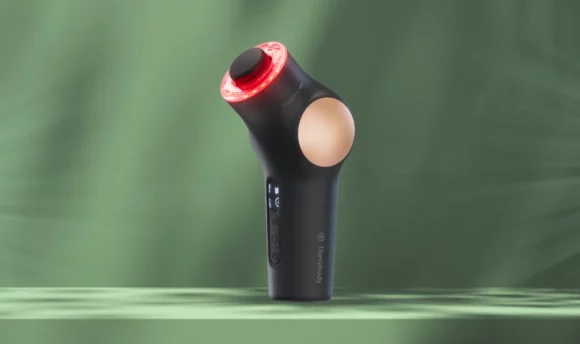Does Niacinamide Help With Acne? What the Experts Say
Not only can acne be painful, but it also contributes to low levels of confidence and self-esteem. Niacinamide is an ingredient often found in skincare products, but can it help to tackle acne-prone skin?

Over the past few years, you may have noticed niacinamide becoming more and more popular in the world of skincare. As well as creeping onto ingredient lists, it has also become the center of many marketing campaigns for its potential to shrink pores and solve spot dilemmas.
Although the ingredient has several benefits for the skin, is it actually effective as an acne treatment, or does it simply boost skin appearance?
Read on to learn the pros and cons of topical niacinamide for acne-prone skin, along with how to use it and what to look out for when purchasing a product containing this vitamin.
Does Niacinamide Help With Acne?
Niacinamide is effective in addressing some factors that cause acne, such as inflammation and excess oil production. This means that it may be helpful for severe types of acne that form as a result of inflammation, like papules and pustules.
However, it is not the most beneficial treatment for acne-prone skin when used alone. This is because it doesn’t kill the bacteria that cause acne or exfoliate the skin.
For severe cases of acne, it should instead be combined with other ingredients, such as benzoyl peroxide, retinoids, and salicylic acid, to help get rid of spots.
What Is Niacinamide?
Also known as vitamin B3, niacinamide is an essential nutrient that ensures fats and sugars are able to function properly in the body. Along with being used to treat acne, it also maintains healthy cells, including those within the skin, and is useful for a variety of health conditions.
This includes cancer, osteoarthritis, diabetes, dermatitis, autoimmune skin conditions, and acne.
Niacinamide occurs naturally in foods such as fish, beans, milk, eggs, and green vegetables and is an ingredient commonly found in over-the-counter skincare products, including topical creams and oral niacinamide supplements.
What Are the Benefits of Niacinamide for Skin?
Niacinamide is great as a multi-tasking skincare treatment, with several uses to help address a variety of skin concerns. Here are 6 benefits of this ingredient:
#1 May help with acne
When you have acne, spots appear as a result of the body’s inflammatory response to cytokines, chemicals in the skin that lead to increased redness.
Niacinamide acts as an anti-inflammatory treatment to reduce the number of cytokines, which lessens the appearance of visible spots. It also fights breakouts by regulating oil production, which is especially effective for those whose acne is caused by oily skin.
#2 Moisturizes the skin
Niacinamide plays a key role in maintaining the epidermis, which is the outermost layer of skin. This protective skin barrier prevents moisture loss, helping to keep your face hydrated, soft, and moisturized.
This protects against acne, as your body will produce more oil to compensate when your skin is dry. As a result, your pores are likely to become clogged from this excess oil, leading to more breakouts.
The vitamin is, therefore, especially beneficial for those with dry or mature skin types.
#3 Protects the skin
Along with retaining moisture, the epidermis is also responsible for controlling the skin’s production of sebum, or oil. Those with oily skin are more prone to developing blackheads, whiteheads, clogged pores, and other types of acne, as this creates the optimal environment for bacteria to grow.
Niacinamide strengthens the epidermis, which sends a signal to the glands that regulate sebum production, helping to return it to normal levels. A strong epidermis also keeps out the bacteria that cause acne.
#4 May treat redness and hyperpigmentation
Even after the active acne has disappeared, you may still be left with scars and hyperpigmentation. This is where the skin darkens in color, which often occurs as an inflammatory acne response.
Niacinamide has been found to stop melanocytes, pigment-producing cells, from transferring dark pigment into neighboring skin cells, reducing hyperpigmentation.
#5 May protect from skin cancer
Spending too much time in the sun puts your skin at a high risk of UV damage. This causes compounds called reactive oxygen species (ROS) to be produced, which are responsible for damaging the skin.
Niacinamide can counter ROS formation, repair DNA, and protect cells, which helps with skin cancer prevention. This is because it has been found to improve actinic keratosis, a skin lesion that often develops into cancer.
#6 Reduces fine lines and wrinkles
As well as being anti-inflammatory, niacinamide also has antioxidant properties. This means that the vitamin fights free radicals that damage the skin, which reduces the appearance of fine lines and wrinkles.
Niacinamide can also increase the production of collagen and elastin, two proteins that are responsible for maintaining the skin’s structure and elasticity. Stores of these proteins naturally deplete as we age, which causes the skin to become wrinkled.
Potential Side Effects of Niacinamide
Some irritation is normal when niacinamide is first introduced into your routine as your skin adjusts to its strength. However, if it persists, it may be a sign that you’re using too much, or that the product you’re using is too strong for your skin.
If you’ve got dry or sensitive skin, you are most at risk of encountering side effects when using niacinamide, including stinging, burning, itching, and redness.
Applying niacinamide topically can cause the body to release histamine, which means that those with preexisting allergies are at a higher risk of experiencing an allergic reaction.
Test for unpleasant side effects by conducting a patch test beforehand. Place a small amount of product on your forearm, wait for 24 hours, and if you experience irritation, wash the area and don’t use the product again.
Can too much niacinamide cause acne?
If you overload your skin with niacinamide, it may begin to purge itself. Purging occurs as a response to ingredients that increase the turnover rate of skin cells, which allows new, healthier cells to emerge.
This may lead to an increase in the number of pustules, a type of acne that manifests on the skin as pus-filled bumps. The process also forces out comedones, follicles that are clogged with oil and dirt, which can appear as black or whiteheads on the skin.
However, this isn’t a common side effect, and studies show that niacinamide may actually reduce pustules due to its anti-inflammatory properties.
How to Use Niacinamide for Acne
As we’ve mentioned, you can get niacinamide naturally from the foods that you eat. However, from cleansers and toners to serums, moisturizers, and wrinkle creams, adding a topical niacinamide product into your skincare routine can be a great way of nourishing your skin from the outside in.
Topical niacinamide
Most forms of topical niacinamide come in serums that should be applied to the entire face after cleansing and toning but before moisturizing.
To properly experience the benefits of niacinamide, it’s recommended to select a product that has a 2–10% concentration. Anything less may be ineffective, and higher concentrations may cause irritation. If you have sensitive skin, use a product with a lower concentration to prevent irritation.
Like with any skincare product, results will vary from person to person. However, clinical research shows that with consistent use of niacinamide, visible changes in skin condition may occur after 6–12 weeks, with one study highlighting a reduction in pustules, papules, and comedones in 8 weeks.
To avoid any irritation and get the best results, you should always use the niacinamide product as directed on the label. Although it can help repair skin damage, it’s also important to note that niacinamide should not be a replacement for sunscreen.
Other Acne Treatment Strategies
For best results in treating acne-prone skin, it is recommended to use niacinamide alongside other active ingredients, which can often be found together in various skincare products. Some ingredients to look out for include:
- Hyaluronic acid – A naturally-occurring chemical that treats problems that may cause acne, including excess oil production, a weak skin barrier, and clogged pores.
- Alpha hydroxy acids (AHA) – Commonly found in skincare products such as glycolic and lactic acid, AHAs reduce inflammation, remove dead skin cells, and stimulate the growth of new skin. This treats acne and reduces the appearance of scars.
- Salicylic acid – A beta hydroxy acid (BHA) that acts as an exfoliant to remove dead skin cells, preventing clogged pores.
- Benzoyl peroxide – Often found in the form of creams, gels, and lotions, this ingredient is used to treat acne by killing bacteria on the skin, removing dead cells, and unclogging pores.
- Retinoids – Derived from vitamin A, retinoids such as isotretinoin (Roaccutane) and adapalene are strong acne treatments that stop pores from being clogged and promote the growth of new cells. They are only available through prescription.
FAQs
You are likely to begin seeing visible results for acne after using niacinamide for 6–12 weeks, although this can vary from person to person.
Yes, you should use products that contain niacinamide twice per day, in the morning and the evening. Applying it more often than this, and with a concentration higher than 10%, is unnecessary and could cause irritation. Try to use niacinamide consistently for at least 6 weeks to see results.
Niacinamide is best for those with oily skin, as it causes the sebaceous glands to reduce their production of oil.
A Word From a Dermatologist
Acne is a skin condition that is often triggered when pores become clogged by dead skin cells, bacteria, and excess sebum (oil). Treatments that fight acne, therefore, help by unclogging pores, lowering sebum production, and causing new cells to grow.
Skincare products that contain niacinamide can be effective in nourishing the skin, removing hyperpigmentation, and reducing the signs of aging. However, you should also try to drink plenty of water, wear sunscreen when outside, take probiotics, and eat a balanced diet if you’re hoping to maintain good skin health.
Before using any new skincare product, you should consult your dermatologist. Niacinamide can cause skin irritation for those with sensitivities, so they may be able to make some recommendations on how to work this vitamin into your skincare routine.
Conclusion
Niacinamide has several benefits for overall skin health, including reducing hyperpigmentation, treating inflammation, and balancing oil production.
This means that using the vitamin alone may help to reduce the appearance of acne, thus helping to control it but not necessarily cure it. Niacinamide is most effective when used with other spot-fighting ingredients such as benzoyl peroxide, salicylic acid, and retinoids.
If you don’t begin to see smoother, hydrated, or firmer skin after using niacinamide regularly for a couple of months, you should speak to a dermatologist. They can give you further advice on which products are best for your skin health, as well as dietary changes that you can make.

















































 Select your language:
Select your language: 








